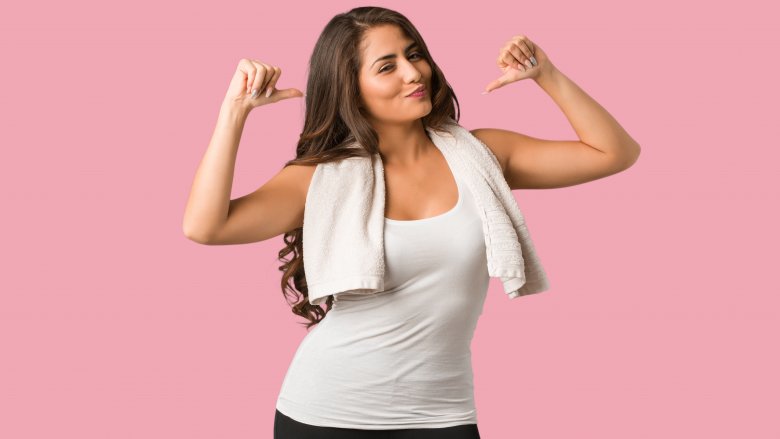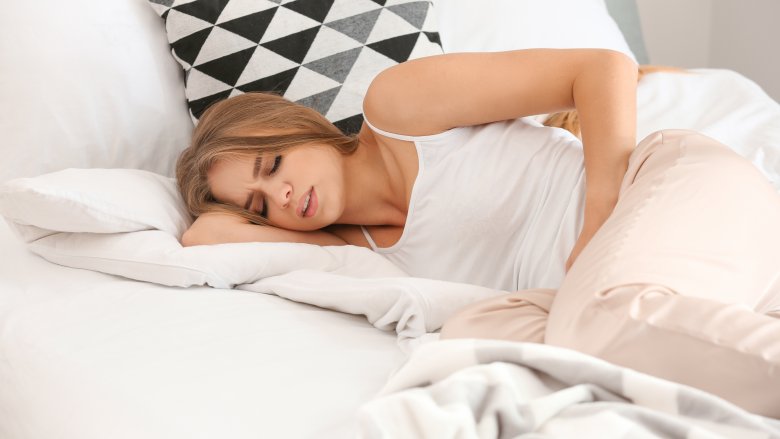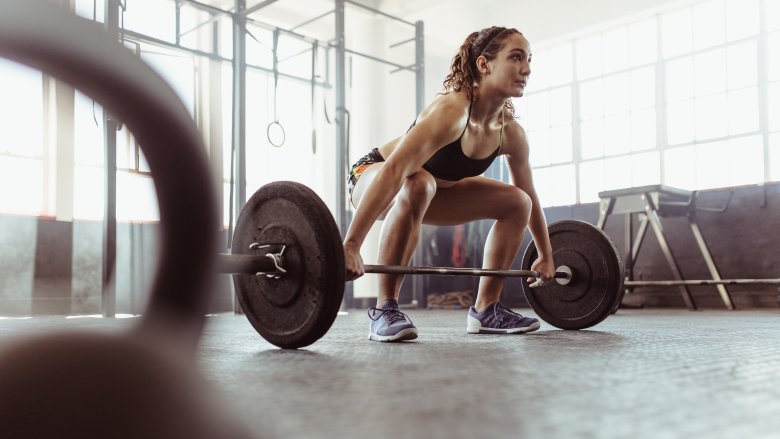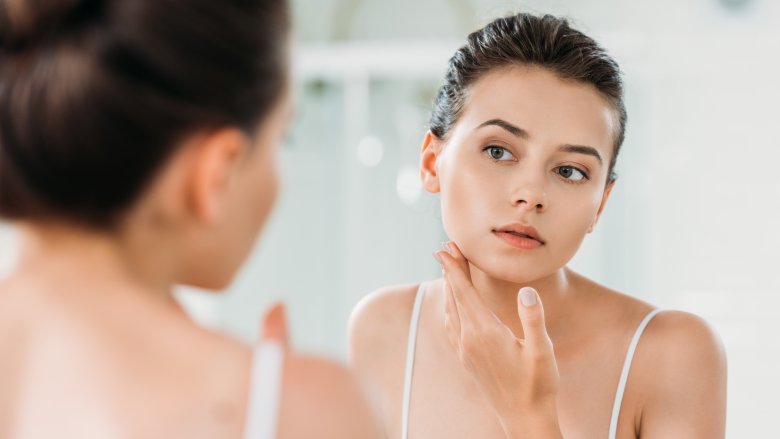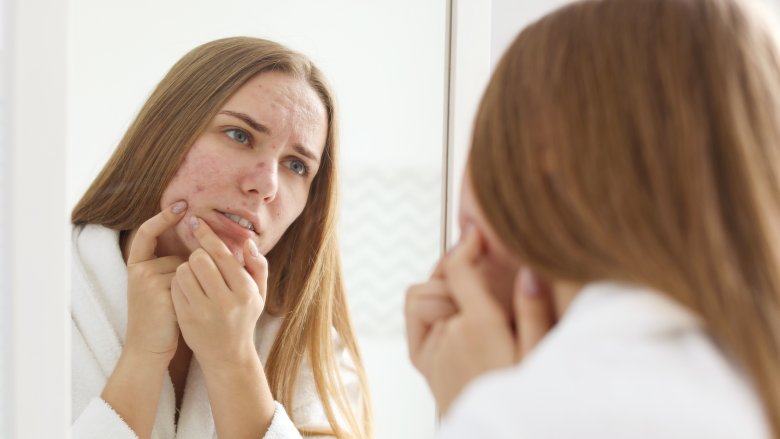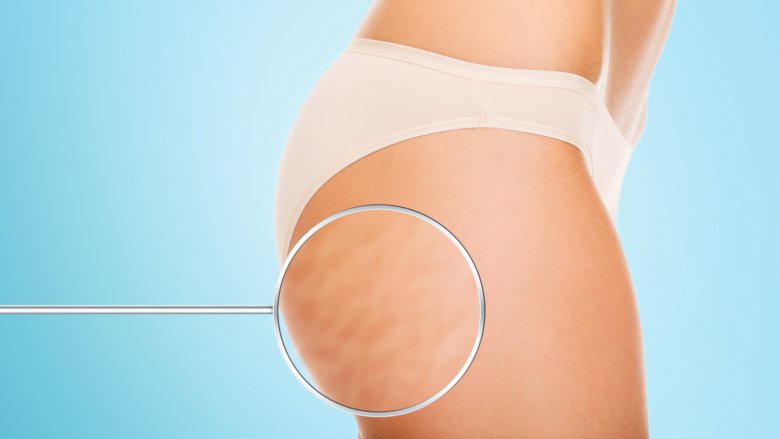Ways Every Woman's Body Changes In Her 20s
Adulting is hard. Perhaps that's what makes your 20s the most difficult period of your life. Comprehensive research obtained by the app company Happify, later compiled by Harvard Business Review, confirmed that stress levels drastically increase in 20-somethings. Oddly enough, stress continues to increase until you hit retirement age — oh goody. What changes, however, is how we're able to cope. Based on the data, HBR revealed that "positive emotions... nearly bottom out during your 20s and early 30s, but on the other side of the [quarter-life] crisis, it's a constant increase in positivity." Yes, it gets better.
While in the thick of your 20s, though, you'll also begin to experience some pretty wild bodily changes — but we promise they're not all bad. Here are some of the things that happen to women during this decade of their lives. Oh, and keep in mind what the wise Dori once said: "When life gets you down, you know what you gotta do? Just keep swimming, just keep swimming..."
Your metabolism peaks — and then declines
Weight-loss expert Christopher Ochner from the Mount Sinai Hospital in New York told Women's Health that most women will achieve their highest basal metabolic rate — which is just a fancy way of saying the amount of calories you burn through by literally just existing — by the time they hit their early 20s. Pretty nice, right?
The exact moment you'll reach this level very much depends on your genetics as well as your activity level. If you're an athlete or someone who exercises on the reg, you'll obviously build more muscle than someone with an inactive lifestyle. Much the same, active people generally have a higher metabolism than others who live a more sedentary lifestyle.
While a healthy, spry metabolism is definitely one of the perks of turning the big 2-0, it's not without a downside. Sadly, maintaining your highest basal metabolic rate isn't really possible. What goes up must come down, and that starts to happen as you cruise through your 20s.
You get some extra curves
Once your metabolism starts its descent, medical doctor Karen Boyle told Cosmopolitan that "you might notice an increase in fat distribution in your hips, thighs, and bust region." At the same time you're metabolism is changing, your hormones begin to change as well and weight gain is nearly inevitable.
Dr. Maria Sophocles added, "Weight normally continues to increase annually in your 20s, mostly due to increase in body fat compared to teen years." If your weight is increasing incrementally, it's nothing to be concerned about. However, Sophocles says "it's important to keep in mind that a normal weight is to have a BMI [body mass index] between 18.5 and 24.9."
While putting on a few pounds may have you thinking about dieting, it's not a great idea. Restricting your caloric intake will actually only make it harder to lose weight, according to Cleveland Clinic nutrition expert Kristin Kirkpatrick. "The more you diet, the more your metabolism may be negatively impacted," she explained. Developing healthy eating and exercise patterns is best.
Your cramps get much worse
By the time you turn 22, you've probably been dealing with your period for around a decade. Although you're totally used to monthly visits from Aunt Flo, there's a chance you weren't acquainted with her evil step-sister: cramps. At least not cramps of the I-think-I'm-dying variety.
David Plourd, medical doctor and assistant professor of obstetrics and gynecology at the Naval Medical Center in San Francisco, California, told Shape that this is all due to hormones called prostaglandins. These hormones enable the lining of the uterus to shed. Your prostaglandins are in "peak production" during your 20s and thus why your cramps become so excruciating.
Although these hormones are an important part of your cycle, you can relieve some of the pain they cause. While you may be used to treating cramps when they occur, taking a pain reliever with Naproxen a few days before getting your period can help lessen the pain cramps cause. Exercising regularly is also advised.
Your bones become stronger
Bone health may be the last thing on your mind in your 20s, but it shouldn't be, according to Dr. Karen Boyle. By the time you hit 30, she told Cosmopolitan, you can already start experiencing bone loss. This makes exercise that much more important in your 20s. Your bones also become increasingly stronger in your 20s — so why not use that to your advantage?
Dr. Maria Sophocles told the publication, "Right now is a great time to eat a diet with adequate calcium and vitamin D, and to get into a pattern of regular weight-bearing exercise, both of which will stimulate growth of bone cells."
The doctor went on to compare bone strength to a savings account. Just as you need to make regular deposits to have your account grow, your bones need deposits of exercise, calcium, and so on to flourish. "Once you hit menopause, you'll lose bone mass faster," she explained, "but if you're making deposits now, there will be a good amount of bone mass stored up."
Your face becomes slimmer
Despite experiencing an increase in body fat in your 20s, your face won't show it. In fact, the "baby fat" you may have had around your cheeks in your teenage years will begin diminishing. Marsha Gordon, professor and vice chairman of the department of dermatology at Mount Sinai Medical Center in New York City, explained why when speaking to Shape. "As you age, subcutaneous fat decreases and you begin losing volume in your face, particularly in your cheeks," she revealed. Collagen also diminishes and leaves your face looking slimmer than it had been years earlier.
While some may be excited to lose their baby faces, others don't love the thought of losing some of their fullness. Dr. Promila Banerjee revealed on RealSelf, saying, "Medical science does not have a magic pill YET to prevent facial fat loss whether it occurs as part of aging or as part of overall weight loss." Nevertheless, she says a good skin care routine can help.
The incredible shrinking ... vulva?
Your face isn't the only part of your body that's going to experience some shrinkage as you get further and further into your 20s. If you're hoping it's your hips or thighs that are going to slim down, we're sorry to disappoint. It's actually your — hold up, what? — vulva. Yes, that's right.
Dr. Karen Boyle told Cosmopolitan that although your vaginal muscles are still strong — we'll take it — you're going to experience some interesting changes to your nether regions. "A woman's fat distribution changes in her 20s...," the doc explained. With that, you might just realize that "your labia major or 'outer lips' and the opening of your vagina" are looking slimmer.
According to Women's Health together with the American Congress of Obstetricians and Gynecologists, a decrease in subcutaneous fat is what causes this shrinkage — just as with the face. So, if you're ever looking for a fun fact to share on someone's 21st birthday, you're welcome.
Acne comes back
"Acne, I've missed you! I'm so happy you've returned," said no one. Ever. Regardless, acne has been known to make a resurgence after the teenage years are long over.
While acne does tend to come to a head in the teenage years, one study of acne's prevalence across the lifespan found that a whopping 45 percent of women between the ages of 21 and 30 reported dealing with adult acne. Even if you had very minor breakouts as a teen, you can still go on experience something much worse as an adult.
Hormones are partly responsible, Joshua Zeichner, a board-certified dermatologist at Mount Sinai Medical Center in New York, revealed to Shape. Additionally, everything from dealing with stress to eating starchy foods to smoking can cause breakouts for women in their 20s. Makeup can also clog pores and worsen acne. For some, switching makeup or facial cleansers can help. Others may need to schedule an appointment with their dermatologist to explore other options.
Hello, cellulite
By your mid-20s, you may start to notice the skin around the back of your thighs or knees looking less smooth and more dimpled. Meet: cellulite. According to Scientific American's interview with osteopathic physician Lionel Bissoon, cellulite is an incredibly common condition. So common, in fact, that it affects 90 percent of women. Most women start to experience the change to their skin between their 25th and 35th birthdays. Although many women don't love the idea of getting cellulite or, at best, are nonplussed by the idea, how cellulite forms is worth noting.
A series of events occurs in the body, beginning with estrogen. When estrogen begins to decreases, you start to experience decreased circulation. A decrease in circulation means less oxygen and nutrition get where they need to go. Less oxygen begets a decrease in collagen production and, as fat cells are enlarging, they start pushing their way through the collagen and — voila! — cellulite. This just proves that cellulite is totally normal — not something any woman need be ashamed of.
You have a rocking sex drive
Thanks to a combination of a couple different reasons, "[your] 20s sex drive is usually rocking," Jennifer Landa, obstetrician-gynecologist and chief medical officer at BodyLogicMD in Orlando, Florida, told Health. She continued, saying, "The biological drive to reproduce is in full force."
Texas-based ob-gyn John Thoppil revealed another cause to the publication. "Desire is often strongest in a new relationship," he says. And, as the 20s are generally when people enter into exciting, new relationships, it makes sense why the sex drive would be high at this time.
If you're in your 20s and not experiencing a "rocking " libido, this could be because of your birth control. "It doesn't have this effect on everyone," Landa explained, "but some women will experience lower testosterone levels on the pill, which can lead to lower libido and even to vaginal dryness in some young women." In which case, the doctor recommends seeing your ob-gyn to explore other methods of birth control and rule out potential health issues.


